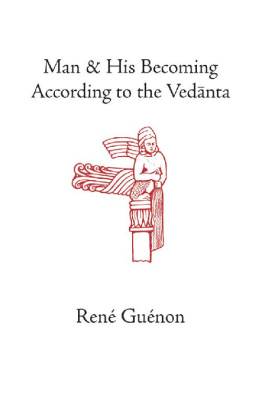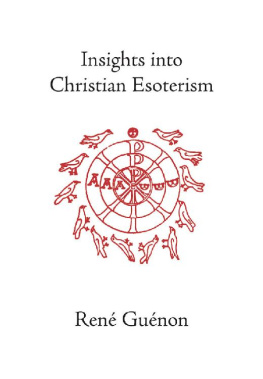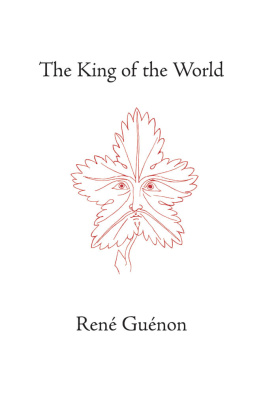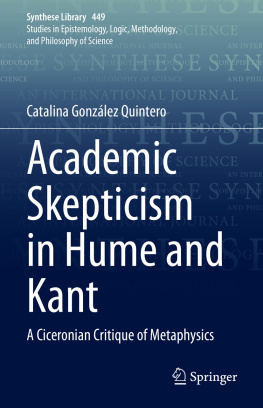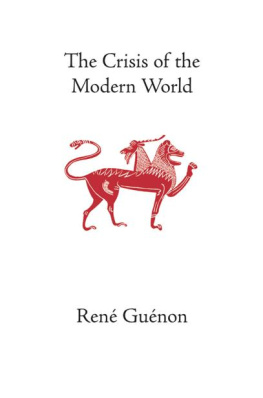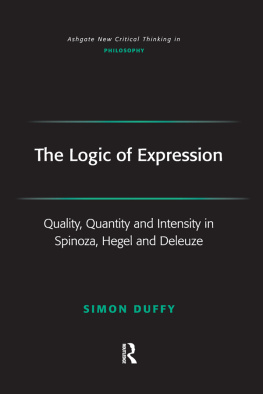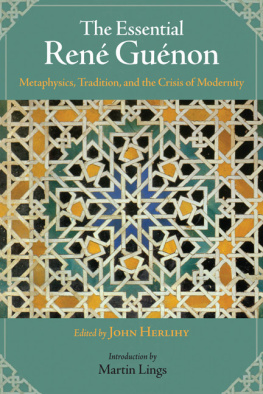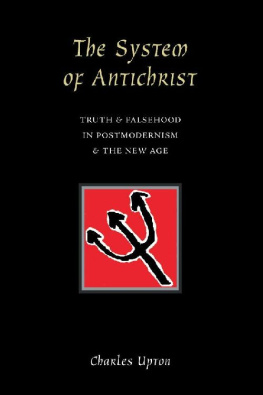René Guénon - The Reign of Quantity and The Signs of the Times
Here you can read online René Guénon - The Reign of Quantity and The Signs of the Times full text of the book (entire story) in english for free. Download pdf and epub, get meaning, cover and reviews about this ebook. year: 2001, publisher: Sophia Perennis, genre: Religion. Description of the work, (preface) as well as reviews are available. Best literature library LitArk.com created for fans of good reading and offers a wide selection of genres:
Romance novel
Science fiction
Adventure
Detective
Science
History
Home and family
Prose
Art
Politics
Computer
Non-fiction
Religion
Business
Children
Humor
Choose a favorite category and find really read worthwhile books. Enjoy immersion in the world of imagination, feel the emotions of the characters or learn something new for yourself, make an fascinating discovery.

The Reign of Quantity and The Signs of the Times: summary, description and annotation
We offer to read an annotation, description, summary or preface (depends on what the author of the book "The Reign of Quantity and The Signs of the Times" wrote himself). If you haven't found the necessary information about the book — write in the comments, we will try to find it.
René Guénon: author's other books
Who wrote The Reign of Quantity and The Signs of the Times? Find out the surname, the name of the author of the book and a list of all author's works by series.
The Reign of Quantity and The Signs of the Times — read online for free the complete book (whole text) full work
Below is the text of the book, divided by pages. System saving the place of the last page read, allows you to conveniently read the book "The Reign of Quantity and The Signs of the Times" online for free, without having to search again every time where you left off. Put a bookmark, and you can go to the page where you finished reading at any time.
Font size:
Interval:
Bookmark:
In Western initiations this takes the form, in the ritual preparation of the recipient, of what is designated as the stripping of metals. It could be said that in a case of this kind the metals, apart from their real power to affect adversely the transmission of spiritual influences, are taken as representing more or less what the Hebrew Kabbalah calls the rinds or the shells (qlippoth), meaning all that is most inferior in the subtle domain, thus constituting, if the expression be allowable, the infra-corporeal pit of our world.
For a full treatment of this theme, reference may be made to the considerations set out, and fully developed, in The Symbolism of the Cross.
Attention may be directed in particular to all questions of ritual related to orientation; this cannot be dwelt on here, and it need only be mentioned that not only are the conditions for the construction of buildings traditionally determined in this way, whether they be temples or houses, but also those for the foundation of cities. The orientation of churches is the last vestige of this that has persisted in the West up to the beginning of modern times, the last vestige, at least, from an exterior point of view, for within the symbolism of initiatic forms considerations of this order, though not generally understood today, have always kept their place, even when the present degenerate condition of affairs has led to a belief that the maintenance of the effective realization of the implied conditions can be dispensed with, and that a purely speculative representation of them is enough.
The Confusion of the Psychic and the Spiritual
The account given above, dealing with some of the psychological explanations that have been applied to traditional doctrines, covers only a particular case of a confusion that is very widespread in the modern world, namely, the confusion of the psychic and the spiritual domains. Even when it is not carried to such a point as to produce a subversion like that of psychoanalysis, this confusion assimilates the spiritual to all that is most inferior in the psychic order; it is therefore extremely serious in every case. In a sense it follows as a natural result of the fact that Westerners have for a very long time past no longer known how to distinguish the soul from the spirit (Cartesian dualism being to a great extent responsible for this, merging as it does into one and the same category everything that is not the body, and designating this one vague and ill-defined category indifferently by either name); and the confusion never ceases to be apparent even in current language: the word spirits is popularly used for psychic entities that are anything but spiritual, and the very name spiritualism is derived from that usage; this mistake, together with another consisting in using the word spirit for something that is really only mental, will be enough by way of example for the present. It is all too easy to see the gravity of the consequences of any such state of affairs: anyone who propagates this confusion, whether intentionally or otherwise and especially under present conditions, is setting beings on the road to getting irremediably lost in the chaos of the intermediary world, and thereby, though often unconsciously, playing the game of the satanic forces that rule over what has been called the counter-initiation.
It is important at this point to be very precise if misunderstanding is to be avoided: it cannot be said that a particular development of the possibilities of a being, even in the comparatively low order represented by the psychic domain, is essentially malefic in itself; but it is necessary not to forget that this domain is above all that of illusions, and it is also necessary to know how to situate each thing in the place to which it normally belongs; in short, everything depends on the use made of any such development; the first thing to be considered is therefore whether it is taken as an end in itself, or on the other hand as a mere means for the attainment of a goal of a superior order. Anything whatever can in fact serve, according to the circumstances of each case, as an opportunity or support to one who has entered upon the way that is to lead him toward a spiritual realization; this is particularly true at the start, because of the diversity of individual natures, which exercises its maximum influence at that point, but it is still true to a certain extent for so long as the limits of the individuality have not been completely left behind. But on the other hand, anything whatever can just as well be an obstacle as a support, if the being does not pass beyond it but allows itself to be deluded and led astray by appearances of realization that have no inherent value and are only accidental and contingent results if indeed they can justifiably be regarded as results from any point of view. The danger of going astray is always present for exactly as long as the being is within the order of individual possibilities; it is without question greatest wherever psychic possibilities are involved, and is naturally greater still when those possibilities are of a very inferior order.
The danger is certainly much less when possibilities confined to the corporeal and physiological order alone are involved, as they are in the case of the aforementioned error of some Westerners who take Yoga, or at least the little they know of its preparatory procedures, to be a sort of method of physical culture; in cases of that kind, almost the only risk incurred is that of obtaining, by practices accomplished ill-advisedly and without control, exactly the opposite result to that desired, and of ruining ones health while seeking to improve it. Such things have no interest here save as examples of a crude deviation in the employment of these practices, for they are really designed for quite a different purpose, as remote as possible from the physiological domain, and natural repercussions occurring in that domain constitute but a mere accident not to be credited with the smallest importance. Nevertheless it must be added that these same practices can also have repercussions in the subtle modalities of the individual unsuspected by the ignorant person who undertakes them as he would a kind of gymnastics, and this considerably augments their danger. In this way the door may be quite unwittingly opened to all sorts of influences (those to take advantage of it in the first place being of course always of the lowest quality), and the less suspicion the victim has of the existence of anything of the kind the less is he prepared against them, and still less is he able to discern their real nature; there is in any event nothing in all this that can claim to be spiritual in any sense.
The state of affairs is quite different in cases where there is a confusion of the psychic properly so called with the spiritual. This confusion moreover appears in two contrary forms: in the first, the spiritual is brought down to the level of the psychic, and this is what happens more particularly in the kind of psychological explanations already referred to; in the second, the psychic is on the other hand mistaken for the spiritual; of this the most popular example is spiritualism, though the other more complex forms of neo-spiritualism all proceed from the very same error. In either case it is clearly the spiritual that is misconceived; but the first case concerns those who simply deny it, at least in practice if not always explicitly, whereas the second concerns those who are subject to the delusion of a false spirituality; and it is this second case that is now more particularly in view. The reason why so many people allow themselves to be led astray by this delusion is fundamentally quite simple: some of them seek above all for imagined powers, or broadly speaking and in one form or another, for the production of more or less extraordinary phenomena; others constrain themselves to centralize their consciousness on inferior prolongations of the human individuality, mistaking them for superior states simply because they are outside the limits within which the activities of the average man are generally enclosed, the limits in question being, in the state corresponding to the profane point of view of the present period, those of what is commonly called ordinary life, into which no possibility of an extra-corporeal order can enter. Even within the latter group it is the lure of the phenomenon, that is to say in the final analysis the experimental tendency in the modern spirit, which is most frequently at the root of the error; what these people are in fact trying to obtain is always results that are in some way sensational, and they mistake such results for realization; but this again amounts to saying that everything belonging to the spiritual order escapes them completely, that they are unable even to conceive of anything of the kind, however remotely; and it would be very much better for them, since they are entirely lacking in spiritual qualification, if they were content to remain enclosed in the commonplace and mediocre security of ordinary life. Of course there can be no question of denying the reality as such of the phenomena concerned; in fact they can be said to be only too real, and for that reason all the more dangerous. What is now being formally contested is their value and their interest, particularly from the point of view of spiritual development, and the delusion itself concerns the very nature of spiritual development. Again, if no more than a mere waste of time and effort were involved, the harm would not after all be so very great, but generally speaking the being that becomes attached to such things soon becomes incapable of releasing itself from them or passing beyond them, and its deviation is then beyond remedy; the occurrence of cases of this kind is well known in all the Eastern traditions, where the individuals affected become mere producers of phenomena and will never attain the least degree of spirituality. But there is still something more, for a sort of inverted development can take place, not only conferring no useful advantage, but taking the being ever further away from spiritual realization, until it is irretrievably astray in the inferior prolongations of its individuality recently mentioned, and through these it can only come into contact with the infra-human. There is then no escape from its situation, or at least there is only one, and that is the total disintegration of the conscious being; such a disintegration is strictly equivalent in the case of the individual to final dissolution in the case of the totality of the manifested cosmos.
Next pageFont size:
Interval:
Bookmark:
Similar books «The Reign of Quantity and The Signs of the Times»
Look at similar books to The Reign of Quantity and The Signs of the Times. We have selected literature similar in name and meaning in the hope of providing readers with more options to find new, interesting, not yet read works.
Discussion, reviews of the book The Reign of Quantity and The Signs of the Times and just readers' own opinions. Leave your comments, write what you think about the work, its meaning or the main characters. Specify what exactly you liked and what you didn't like, and why you think so.

